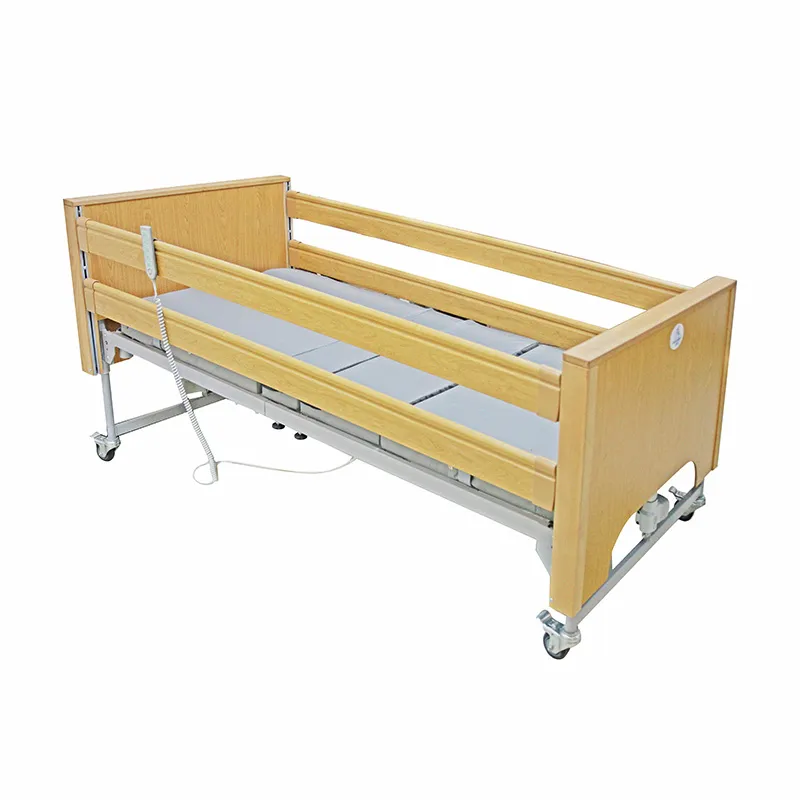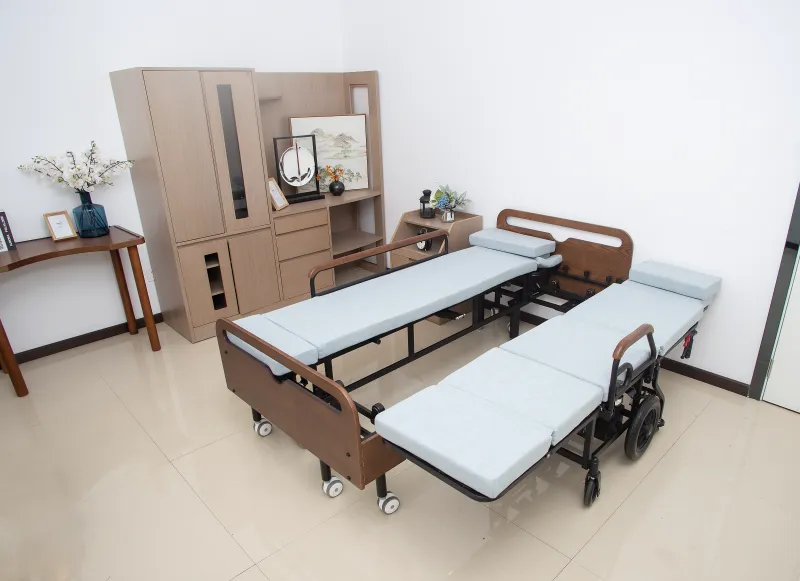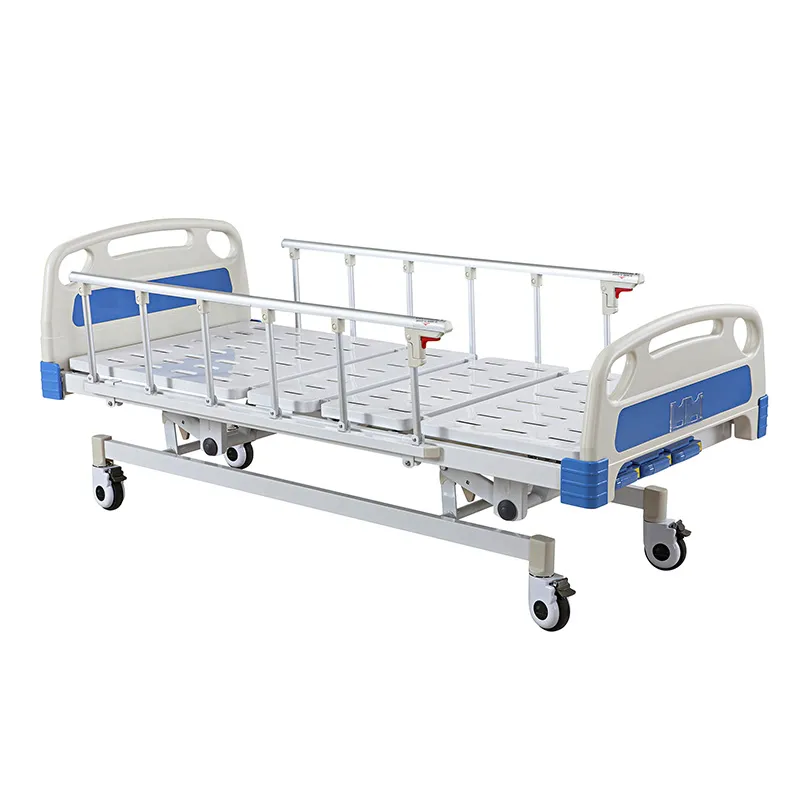
Why would anyone need a home hospital bed?
2024-10-21 15:30
The demand for home hospital beds not only stems from comfort and convenience, but also represents the improvement of patients' medical needs and quality of life. For some long-term bedridden, recovering patients or elderly people with limited mobility, home hospital beds are not only life aids, but also an indispensable medical equipment.

Why would anyone need a home hospital bed?
The demand for home hospital beds is often closely related to the health status of patients. Whether due to chronic illness, severe trauma, post-operative recovery, or reduced mobility due to aging, home hospital beds can provide essential support for these patients. While traditional beds cannot provide the required adjustment and comfort, home hospital beds can significantly improve a patient's quality of life through their unique design and functionality.
Many patients may need to spend extended periods of time in bed, making comfort and safety top of mind. Ordinary beds cannot provide height, back, and leg adjustments, which may cause discomfort or even complications for patients while lying in bed. Home hospital beds can adjust to the patient's needs, reduce pressure points, help prevent bedsores, and make it easier for caregivers to provide better patient care.
Home hospital beds: providing more comfort for patients
For patients, the biggest advantages of a home hospital bed are its comfort and adjustability. Traditional beds usually limit the patient's range of motion, while home hospital beds help patients find the most comfortable position in bed through a variety of adjustment functions. For example, the lifting function of the head and foot of the bed can adjust the patient to a semi-recumbent, sitting or lying position as needed, which not only improves comfort, but also promotes blood circulation and relieves the pressure caused by long-term bed rest.
In addition, home hospital beds are equipped with sturdy guardrails to prevent patients from accidentally falling. The height of the guardrail is adjustable to ensure patient safety while allowing caregivers to easily access the patient. Breathable materials are often used on the bed surface to further reduce the occurrence of bedsores. Compared with traditional beds, home hospital beds are designed to be more ergonomic and can provide better support and protection for patients.
Medical Perspective: Why patients may need a hospital bed at home
From a medical perspective, certain diseases or conditions may require patients to use a home hospital bed. Here are some common scenarios:
1. Long-term bed rest: Certain chronic diseases such as multiple sclerosis and Parkinson's disease can cause patients to stay in bed for a long time. Home hospital beds can provide patients with a stable bed rest environment and reduce the risk of complications such as bedsores.
2. Postoperative recovery: The postoperative recovery period requires patients to stay in bed for a long time. Adjusting the posture of the home hospital bed can reduce pain and promote recovery.
3. Respiratory diseases: Patients with chronic obstructive pulmonary disease (COPD) or other respiratory diseases may need to maintain a specific sleeping position, and a home hospital bed can help patients find a position that is comfortable and conducive to breathing.
4. Inconvenient mobility: For the elderly or disabled people with limited mobility, home hospital beds can not only provide a safe resting environment, but also make it easier for patients to get in and out of bed through the lifting function.

Home hospital beds: How do they adapt to individual patient needs?
Every patient's needs are different, so home hospital beds are designed with a variety of features and configurations in mind to accommodate different needs. For example, some hospital beds have electric adjustment functions that allow patients to adjust the bed's height or angle on their own, while other beds have manual adjustment options for patients who don't need frequent adjustments.
Stress management is crucial for patients who are bedridden for long periods of time. Home hospital beds are often equipped with anti-decubitus mattresses, which distribute pressure evenly and reduce the risk of skin damage. Some high-end mattresses also have air cushion functions that can regularly adjust pressure distribution to further reduce the occurrence of bedsores.
Medical Beds: What makes a fully electric hospital bed ideal for home use?
Fully electric hospital beds are ideal for home care due to their high level of adjustability and ease of use. All adjustment functions of this type of hospital bed can be operated by remote control, including bed height, back and leg raising and lowering. This is a great convenience for both caregivers and patients. Patients can adjust the bed position at any time according to their comfort, and caregivers can more easily perform care operations, such as helping patients get in and out of bed or adjust their posture.
Fully electric hospital beds are often equipped with a backup battery system to ensure they can still operate in the event of a power outage, which is an additional guarantee for patient safety. In addition, the structure of this type of hospital bed is usually very sturdy and can support a higher body weight, making it suitable for patients of different sizes.
Semi-electric hospital bed vs. fully electric home hospital bed: Which one is better?
Home hospital beds are divided into two types: semi-electric and fully electric. The back and leg adjustments of a semi-electric hospital bed are done electrically, but the height adjustment of the bed requires manual operation. This type of hospital bed is suitable for patients who do not need frequent height adjustments and is relatively economical. The fully electric hospital bed can fully adjust various parts electrically, which is suitable for patients who need to frequently adjust their posture.
Fully electric hospital beds offer greater convenience and comfort, but also cost more. For families with a looser budget, fully electric hospital beds are a better choice. Semi-electric hospital beds find a balance between cost and functionality, making them an ideal choice for families with limited budgets.
Why should my loved one get a home hospital bed?
For some patients, a home hospital bed is not only a comfortable place to rest, but also an important tool to improve the quality of life. It can help patients regain their ability to take care of themselves, reduce their dependence on caregivers, and also reduce the care burden for their families. Home hospital beds provide patients with a safe, comfortable and healthy bed environment through their adjustability and safety design.
In addition, home hospital beds can promote recovery, speed up postoperative recovery, and reduce the occurrence of complications. For those patients who are bedridden for a long time, home hospital beds can also improve the patient's quality of life by reducing the occurrence of bed sores and other problems. Overall, home hospital beds are an integral part of care and health management.

What are the important considerations and brands when choosing a home medical bed for patients who require extended periods of rest and care?
When choosing a home hospital bed, there are several key factors to consider. The first is the function of the bed: whether it needs full electric adjustment, whether it needs a special mattress (such as an anti-decubitus mattress), and whether the height of the bed can be adjusted to facilitate the operation of the caregiver. The second is the size and load-bearing capacity of the bed: a suitable bed needs to be selected based on the patient's body shape and usage environment. Finally, budget and after-sales service: It is very important to choose a brand that provides excellent after-sales service.
Some well-known home hospital bed brands include Drive Medical, Invacare, Medline and Joerns. They offer a variety of hospital bed models, from basic to advanced fully electric beds, to meet the needs of different patients.
How does budget affect home hospital bed selection, and what types of beds are available at different price points?
Budget is an important factor when choosing a home hospital bed. Basic semi-electric hospital beds are usually more affordable and suitable for patients who don’t need frequent bed adjustments. Fully electric hospital beds have more complete functions and are relatively expensive. In addition, some premium mattresses and special features (such as air mattresses, anti-bedsore systems, etc.) will also increase the cost.
Among hospital beds at different price points, economical hospital beds usually have basic manual or semi-electric adjustment functions and are suitable for families with limited budgets. Mid- to high-end hospital beds provide higher comfort and convenience, and are suitable for patients who need frequent bed adjustments or have special care needs. Advanced hospital beds are usually equipped with fully electric adjustments and advanced mattress systems, which are suitable for critically ill or long-term bedridden patients.








